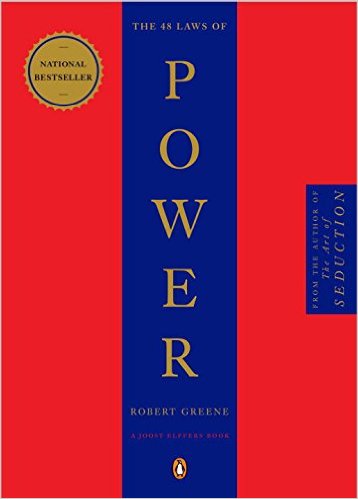- Paperback: ۴۵۲ pages
- Publisher: Penguin Books; 1st edition (September 1, 2000)
- Language: English
- ISBN-10: ۰۱۴۰۲۸۰۱۹۷
- ISBN-13: ۹۷۸-۰۱۴۰۲۸۰۱۹۷
- Product Dimensions: ۶.۵ x 1.3 x 9.1 inches
- Shipping Weight: ۱.۷ pounds (View shipping rates and policies)
- Average Customer Review: ۴.۶ out of 5 stars See all reviews (۲,۲۷۵ customer reviews)
The 48 Laws of Power
0 تومان
by Robert Greene
The New York Times Bestseller
Amoral, cunning, ruthless, and instructive, The 48 Laws of Power is the definitive manual for anyone interested in gaining, observing, or defending against ultimate control.
In the book that People magazine proclaimed “beguiling” and “fascinating,” Robert Greene and Joost Elffers have distilled three thousand years of the history of power into 48 essential laws by drawing from the philosophies of Machiavelli, Sun Tzu, and Carl Von Clausewitz and also from the lives of figures ranging from Henry Kissinger to P.T. Barnum.
Some laws teach the need for prudence (“Law 1: Never Outshine the Master”), others teach the value of confidence (“Law 28: Enter Action with Boldness”), and many recommend absolute self-preservation (“Law 15: Crush Your Enemy Totally”). Every law, though, has one thing in common: an interest in total domination. In a bold and arresting two-color package, The 48 Laws of Power is ideal whether your aim is conquest, self-defense, or simply to understand the rules of the game.
محصولات مرتبط
automobile electrical and electronic systems
by Tom Denton
This textbook will help you learn all the skills you need to pass Level 3 Vehicle Electrical and Electronic Systems courses or related modules from City and Guilds, IMI Awards and BTEC. It is also ideal for ASE, AUR and higher level qualifications.
As electrical and electronic systems become increasingly more complex and fundamental to the workings of modern vehicles, understanding these systems is essential for automotive technicians. For students new to the subject, this book will help to develop this knowledge, but will also assist experienced mechanics in keeping up with recent technological advances. This new edition includes information on developments in hybrid car technology, GPS, multiplexing, and electronic stability/vehicle dynamics control. In full colour and covering the latest course specifications, this is the guide that no student enrolled on an automotive maintenance and repair course should be without.
Designed to make learning easier, this book contains:
- Photographs, flow charts, quick reference tables, overview descriptions and step-by-step instructions
- Case studies to help you put the principles covered into real-life context
- Useful margin features throughout, including definitions, key facts and ‘safety first’ considerations
Biocentrism: How Life and Consciousness are the Keys to Understanding the True Nature of the Universe
by Robert Lanza (Author), Bob Berman (Author)
Robert Lanza is one of the most respected scientists in the world—a US News & World Report cover story called him a “genius” and a “renegade thinker,” even likening him to Einstein. Lanza has teamed with Bob Berman, the most widely read astronomer in the world, to produce Biocentrism, a revolutionary new view of the universe.
Every now and then a simple yet radical idea shakes the very foundations of knowledge. The startling discovery that the world was not flat challenged and ultimately changed the way people perceived themselves and their relationship with the world. For most humans of the 15th century, the notion of Earth as ball of rock was nonsense. The whole of Western, natural philosophy is undergoing a sea change again, increasingly being forced upon us by the experimental findings of quantum theory, and at the same time, towards doubt and uncertainty in the physical explanations of the universe’s genesis and structure. Biocentrism completes this shift in worldview, turning the planet upside down again with the revolutionary view that life creates the universe instead of the other way around.
In this paradigm, life is not an accidental byproduct of the laws of physics. Biocentrism takes the reader on a seemingly improbable but ultimately inescapable journey through a foreign universe—our own—from the viewpoints of an acclaimed biologist and a leading astronomer. Switching perspective from physics to biology unlocks the cages in which Western science has unwittingly managed to confine itself. Biocentrism will shatter the reader’s ideas of life—time and space, and even death. At the same time it will release us from the dull worldview of life being merely the activity of an admixture of carbon and a few other elements; it suggests the exhilarating possibility that life is fundamentally immortal.
The 21st century is predicted to be the Century of Biology, a shift from the previous century dominated by physics. It seems fitting, then, to begin the century by turning the universe outside-in and unifying the foundations of science with a simple idea discovered by one of the leading life-scientists of our age. Biocentrism awakens in readers a new sense of possibility, and is full of so many shocking new perspectives that the reader will never see reality the same way again.
Bosch Automotive Electrics and Automotive Electronics
by Robert Bosch GmbH
This is a complete reference guide to automotive electrics and electronics. This new edition of the definitive reference for automotive engineers, compiled by one of the world's largest automotive equipment suppliers, includes new and updated material. As in previous editions different topics are covered in a concise but descriptive way backed up by diagrams, graphs, photographs and tables enabling the reader to better comprehend the subject. This fifth edition revises the classical topics of the vehicle electrical systems such as system architecture, control, components and sensors. There is now greater detail on electronics and their application in the motor vehicle, including electrical energy management (EEM) and discusses the topic of inter system networking within the vehicle. It also includes a description of the concept of hybrid drive a topic that is particularly current due to its ability to reduce fuel consumption and therefore CO2 emissions.This book will benefit automotive engineers and design engineers, automotive technicians in training and mechanics and technicians in garages. It may also be of interest to teachers/ lecturers and students at vocational colleges, and enthusiasts.
Darwin’s Doubt: The Explosive Origin of Animal Life and the Case for Intelligent Design
by Stephen C. Meyer
When Charles Darwin finished The Origin of Species, he thought that he had explained every clue, but one. Though his theory could explain many facts, Darwin knew that there was a significant event in the history of life that his theory did not explain. During this event, the “Cambrian explosion,” many animals suddenly appeared in the fossil record without apparent ancestors in earlier layers of rock.
In Darwin’s Doubt, Stephen C. Meyer tells the story of the mystery surrounding this explosion of animal life—a mystery that has intensified, not only because the expected ancestors of these animals have not been found, but because scientists have learned more about what it takes to construct an animal. During the last half century, biologists have come to appreciate the central importance of biological information—stored in DNA and elsewhere in cells—to building animal forms.
Expanding on the compelling case he presented in his last book, Signature in the Cell, Meyer argues that the origin of this information, as well as other mysterious features of the Cambrian event, are best explained by intelligent design, rather than purely undirected evolutionary processes.
Quantum Enigma: Physics Encounters Consciousness 2nd Edition
by Bruce Rosenblum (Author), Fred Kuttner (Author)
In trying to understand the atom, physicists built quantum mechanics, the most successful theory in science and the basis of one-third of our economy. They found, to their embarrassment, that with their theory, physics encounters consciousness. Authors Bruce Rosenblum and Fred Kuttner explain all this in non-technical terms with help from some fanciful stories and anecdotes about the theory's developers. They present the quantum mystery honestly, emphasizing what is and what is not speculation. Quantum Enigma's description of the experimental quantum facts, and the quantum theory explaining them, is undisputed. Interpreting what it all means, however, is heatedly controversial. But every interpretation of quantum physics involves consciousness. Rosenblum and Kuttner therefore turn to exploring consciousness itself--and encounter quantum mechanics. Free will and anthropic principles become crucial issues, and the connection of consciousness with the cosmos suggested by some leading quantum cosmologists is mind-blowing. Readers are brought to a boundary where the particular expertise of physicists is no longer the only sure guide. They will find, instead, the facts and hints provided by quantum mechanics and the ability to speculate for themselves.
In the few decades since the Bell's theorem experiments established the existence of entanglement (Einstein's "spooky action"), interest in the foundations, and the mysteries, of quantum mechanics has accelerated. In recent years, physicists, philosophers, computer engineers, and even biologists have expanded our realization of the significance of quantum phenomena. This second edition includes such advances. The authors have also drawn on many responses from readers and instructors to improve the clarity of the book's explanations.
Sapiens: A Brief History of Humankind
by Yuval Noah Harari
New York Times Bestseller
A Summer Reading Pick for President Barack Obama, Bill Gates, and Mark Zuckerberg
From a renowned historian comes a groundbreaking narrative of humanity’s creation and evolution—a #1 international bestseller—that explores the ways in which biology and history have defined us and enhanced our understanding of what it means to be “human.”
One hundred thousand years ago, at least six different species of humans inhabited Earth. Yet today there is only one—homo sapiens. What happened to the others? And what may happen to us?
Most books about the history of humanity pursue either a historical or a biological approach, but Dr. Yuval Noah Harari breaks the mold with this highly original book that begins about 70,000 years ago with the appearance of modern cognition. From examining the role evolving humans have played in the global ecosystem to charting the rise of empires, Sapiens integrates history and science to reconsider accepted narratives, connect past developments with contemporary concerns, and examine specific events within the context of larger ideas.
Dr. Harari also compels us to look ahead, because over the last few decades humans have begun to bend laws of natural selection that have governed life for the past four billion years. We are acquiring the ability to design not only the world around us, but also ourselves. Where is this leading us, and what do we want to become?
Featuring 27 photographs, 6 maps, and 25 illustrations/diagrams, this provocative and insightful work is sure to spark debate and is essential reading for aficionados of Jared Diamond, James Gleick, Matt Ridley, Robert Wright, and Sharon Moalem.
Seven Brief Lessons on Physics
by Carlo Rovelli
Look out for Carlo Rovelli's next book, Reality Is Not What It Seems.
Instant New York Times Bestseller
“One of the year’s most entrancing books about science.”—The Wall Street Journal
“Clear, elegant...a whirlwind tour of some of the biggest ideas in physics.”—The New York Times Book Review
This playful, entertaining, and mind-bending introduction to modern physics briskly explains Einstein's general relativity, quantum mechanics, elementary particles, gravity, black holes, the complex architecture of the universe, and the role humans play in this weird and wonderful world. Carlo Rovelli, a renowned theoretical physicist, is a delightfully poetic and philosophical scientific guide. He takes us to the frontiers of our knowledge: to the most minute reaches of the fabric of space, back to the origins of the cosmos, and into the workings of our minds. The book celebrates the joy of discovery. “Here, on the edge of what we know, in contact with the ocean of the unknown, shines the mystery and the beauty of the world,” Rovelli writes. “And it’s breathtaking.”
Stealing from God: Why Atheists Need God to Make Their Case
by Frank Turek (Author), Ravi Zacharias (Foreword)
If you think atheists have reason, evidence, and science on their side, think again! Award-winning author Dr. Frank Turek (I Don’t Have Enough Faith to be an Atheist) will show you how atheists steal reason, evidence, science, and other arguments from God in trying to make their case for atheism. If that sounds contradictory, it’s because it is! Atheists can’t make their case without appealing to realities only theism can explain. In an engaging and memorable way, Stealing from God exposes these intellectual crimes atheists are committing and then provides four powerful reasons for why Christianity is true.
The Eerie Silence: Renewing Our Search for Alien Intelligence
by Paul Davies
One of the world’s leading scientists explains why—and how—the search for intelligent life beyond Earth should be expanded.
Fifty years ago, a young astronomer named Frank Drake first pointed a radio telescope at nearby stars in the hope of picking up a signal from an alien civilization. Thus began one of the boldest scientific projects in history, the Search for Extraterrestrial Intelligence (SETI). After a half-century of scanning the skies, however, astronomers have little to report but an eerie silence—eerie because many scientists are convinced that the universe is teeming with life. Physicist and astrobiologist Paul Davies has been closely involved with SETI for three decades and chairs the SETI Post-Detection Taskgroup, charged with deciding what to do if we’re suddenly confronted with evidence of alien intelligence. He believes the search so far has fallen into an anthropocentric trap—assuming that an alien species will look, think, and behave much like us. In this provocative book Davies refocuses the search, challenging existing ideas of what form an alien intelligence might take, how it might try to communicate with us, and how we should respond if it does.
The Golden Ratio: The Story of PHI, the World’s Most Astonishing Number
by Mario Livio
Throughout history, thinkers from mathematicians to theologians have pondered the mysterious relationship between numbers and the nature of reality. In this fascinating book, Mario Livio tells the tale of a number at the heart of that mystery: phi, or 1.6180339887...This curious mathematical relationship, widely known as "The Golden Ratio," was discovered by Euclid more than two thousand years ago because of its crucial role in the construction of the pentagram, to which magical properties had been attributed. Since then it has shown a propensity to appear in the most astonishing variety of places, from mollusk shells, sunflower florets, and rose petals to the shape of the galaxy. Psychological studies have investigated whether the Golden Ratio is the most aesthetically pleasing proportion extant, and it has been asserted that the creators of the Pyramids and the Parthenon employed it. It is believed to feature in works of art from Leonardo da Vinci's Mona Lisa to Salvador Dali's The Sacrament of the Last Supper, and poets and composers have used it in their works. It has even been found to be connected to the behavior of the stock market!
The Golden Ratio is a captivating journey through art and architecture, botany and biology, physics and mathematics. It tells the human story of numerous phi-fixated individuals, including the followers of Pythagoras who believed that this proportion revealed the hand of God; astronomer Johannes Kepler, who saw phi as the greatest treasure of geometry; such Renaissance thinkers as mathematician Leonardo Fibonacci of Pisa; and such masters of the modern world as Goethe, Cezanne, Bartok, and physicist Roger Penrose. Wherever his quest for the meaning of phi takes him, Mario Livio reveals the world as a place where order, beauty, and eternal mystery will always coexist.
What If?: Serious Scientific Answers to Absurd Hypothetical Questions
by Randall Munroe
From the creator of the wildly popular webcomic xkcd, hilarious and informative answers to important questions you probably never thought to ask.
Millions of people visit xkcd.com each week to read Randall Munroe’s iconic webcomic. His stick-figure drawings about science, technology, language, and love have a large and passionate following.
Fans of xkcd ask Munroe a lot of strange questions. What if you tried to hit a baseball pitched at 90 percent the speed of light? How fast can you hit a speed bump while driving and live? If there was a robot apocalypse, how long would humanity last?
In pursuit of answers, Munroe runs computer simulations, pores over stacks of declassified military research memos, solves differential equations, and consults with nuclear reactor operators. His responses are masterpieces of clarity and hilarity, complemented by signature xkcd comics. They often predict the complete annihilation of humankind, or at least a really big explosion.
The book features new and never-before-answered questions, along with updated and expanded versions of the most popular answers from the xkcd website. What If? will be required reading for xkcd fans and anyone who loves to ponder the hypothetical.
Word Power Made Easy: The Complete Handbook for Building a Superior Vocabulary Mass Market
by Norman Lewis
The most effective English language vocabulary builder available: this time-tested classic has helped millions achieve mastery of English both in its written and spoken forms. Word Power Made Easy provides a simple, step-by-step method for increasing knowledge and mastery of the language. Arranged in thematic sections—on everything from how to flatter friends and insult enemies to how to talk precisely about science and medicine—the book is written in a lively, accessible, and often humorous style, presenting ideas and a method of broadening your knowledge as an integral part of vocabulary-building. The author delves into etymology to arm the reader to decode unfamiliar words, provides phonetic pronunciations, gives tips on avoiding common spelling errors, and offers useful sections on which fussy, old-fashioned grammar rules are valid and which are outdated or misguided and can be safely ignored. Loaded with helpful reviews, progress checks, and quizzes to reinforce the material, this classic resource—first published sixty years ago—has helped millions learn to speak and write with greater sophistication.



























نقد و بررسیها
هنوز بررسیای ثبت نشده است.